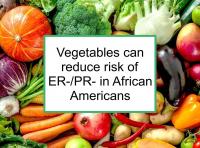A new prospective study has reported that frequent vegetable consumption can reduce the risk of hormone receptor negative breast cancer among African American women. Hormone receptor negative tumors are estrogen receptor negative (ER-) and progesterone receptor negative (ER+). The majority of ER-/PR- breast cancer is also HER2-.
The study was designed to investigate the association between fruit and vegetable consumption and risk of breast cancer in 51,928 women African American women. The women were enrolled in the Black Women's Health Study in 1995. A food questionnaire was used to determine food consumption. A total of 1,268 new cases of breast cancer were found during the 12-year follow-up period.
Total fruit, total vegetable, and total fruit and vegetable consumption were not found to be related to overall risk of breast cancer. However, consumption of cruciferous vegetables and carrots both were found to be associated with lower risk of breast cancer in this group.
Examples of cruciferous vegetables include collard and mustard greens, broccoli, brussels sprouts, cabbage and kale. Most significantly, total vegetable consumption was found to be associated with a lower risk of hormone receptor negative breast cancer. Black women who consumed at least two servings of vegetables per day had a 43% lower incidence of ER-/PR- breast cancer than those who consumed fewer than four vegetable servings per week.
Please see our article on breast cancer diet for triple negative patients and survivors for more information on how to optimize diet to reduce risk of recurrence for hormone receptor negative breast cancer.
